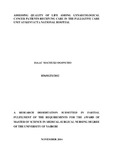| dc.description.abstract | Quality of life (QOL) assessment among cancer patients is considered to be an important
aspect in palliative care. QOL assessment helps in the identification of the physical,
psychological, social and spiritual needs of the patient. Gynaecological cancers are among the
most common types of cancers afflicting women. Although patient assessment and palliative
care among cancer patients is undertaken at the palliative care unit of Kenyatta National
Hospital (KNH), how the disease and its treatment affect the QOL of these patients is
unknown. This study sought to determine the QOL and its associated factors among Kenyan
women with gynaecological cancers receiving palliative care. Predictors of QOL were also
evaluated. A cross sectional descriptive study was conducted that included 108 respondents
diagnosed with endometrial, ovarian, cervical or vulva cancers being followed up and treated
in the palliative care unit at Kenyatta National Hospital. The data was collected between the
months of April and June 2014. QOL was measured using the Missoula Vitas QOL Index.
The association between socio-demographic and clinical factors with QOL was analyzed
using one way ANOVA and linear regression analysis to identify the predictors of QOL. The
mean total QOL score was reported to be 17.2 (expected range 0-30); mean global QOL score
of 3.5 (range 0-5). The symptom subscale had the highest score (mean 8.2); followed by
transcendent subscale (mean 6.2); then function subscale (mean 5.6); then interpersonal
subscale (mean 5.3) and wellbeing subscale had the least score (mean -2.9). Women aged 65
years and above, with secondary or tertiary levels of education had high mean total QOL
scores. Patients who were formally employed and earned more than 10,000 Kenyan shillings
were reported to have high mean total QOL scores. Patients with ovarian and endometrial
cancers were reported to have higher mean total QOL scores than those with cervical and
vulva cancers. Age, level of education, occupation, average monthly income, type of cancer
treatment, duration of illness and type of cancer were reported to be the independent
predictors of QOL. The quality of life among gynaecological cancer patients receiving
palliative care at KNH was moderate but tended towards high QOL. The psychological and
social needs of these patients are not adequately identified and addressed. Age, education,
occupation, income, type of cancer, type of cancer treatment and duration of illness were the
factors influencing QOL. There is need to adopt a QOL assessment instrument in the
palliative care unit to assist the palliative care team members in identifying and addressing
specific needs that affect the QOL of patients with advanced cancer. | en_US |
| dc.description.department | a
Department of Psychiatry, University of Nairobi, ; bDepartment of Mental Health, School of Medicine,
Moi University, Eldoret, Kenya | |

